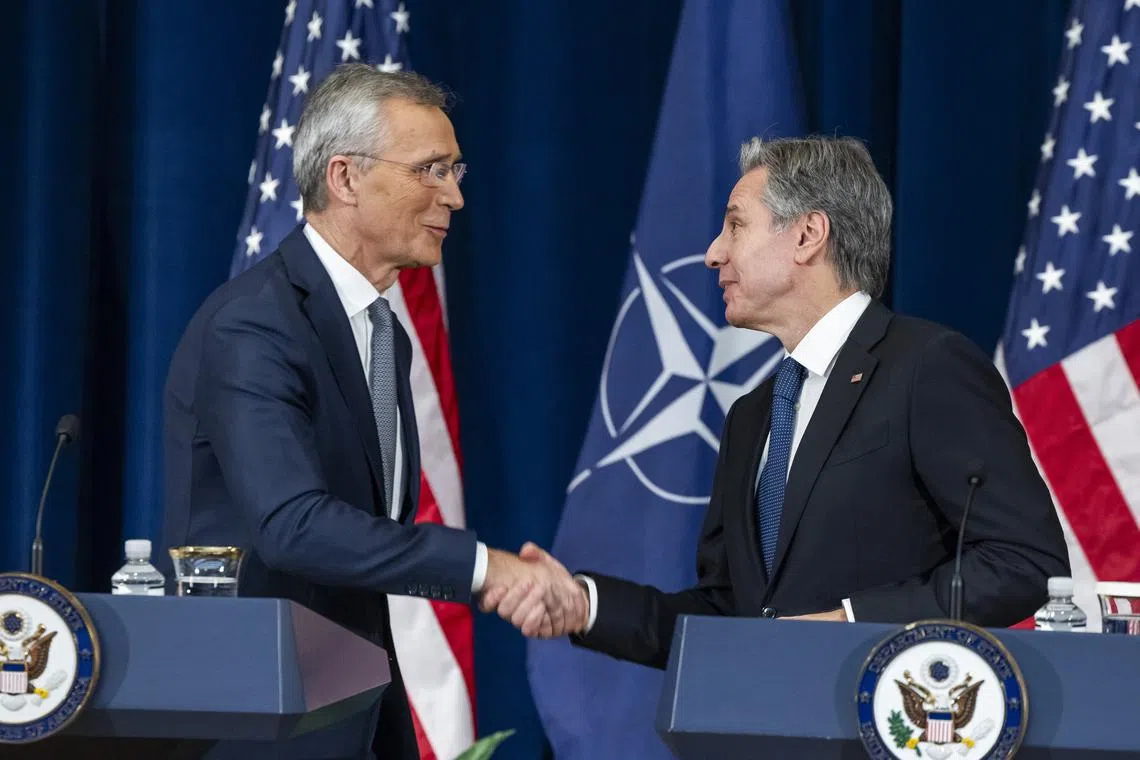Blinken tells Nato chief Ukraine’s defensive war in jeopardy without new funding
Sign up now: Get ST's newsletters delivered to your inbox

Nato Secretary-General Jens Stoltenberg (left) with US Secretary of State Antony Blinken during a joint news conference in Washington, on Jan 29.
PHOTO: EPA-EFE
Follow topic:
WASHINGTON – US Secretary of State Antony Blinken has warned that Ukraine’s gains over two years of fighting were all in doubt without new US funding, as Nato’s chief visited to lobby Congress.
Tens of billions of dollars in US aid has been sent to Ukraine
As Nato Secretary-General Jens Stoltenberg made the case on a visit to Washington, Mr Blinken offered an increasingly dire picture of Ukraine’s prospects without US approval of the so-called supplemental funding.
“Without it, simply put, everything that Ukrainians achieved and that we’ve helped them achieve will be in jeopardy,” Mr Blinken told a joint news conference with Mr Stoltenberg on Jan 29.
“Absent that supplemental, we’re going to be sending a strong and wrong message to all of our adversaries that we are not serious about the defence of freedom, the defence of democracy.
“It will simply reinforce for Vladimir Putin that he can somehow outlast Ukraine and outlast us.”
President Joe Biden has asked Congress to approve US$61 billion (S$82 billion) in new aid to Ukraine.
But the talks have bogged down as Republican lawmakers – furious over record flows of migrants over the US border with Mexico
Mr Stoltenberg said he would meet US lawmakers on Jan 30 and make the case that support for Ukraine was “in our own security interest”.
“It will be a tragedy for Ukrainians if President Putin wins but it will also make the world more dangerous and all of us more insecure,” Mr Stoltenberg said.
“It will embolden other authoritarian leaders – not only President Putin, but also North Korea, Iran and China to use force.”
With many Republicans focused on opposing China, Mr Stoltenberg said: “Today it’s Ukraine; tomorrow it could be Taiwan.”
US and Nato officials have acknowledged limited gains in a counteroffensive launched by Ukraine in 2023.
But Mr Stoltenberg said that Ukrainians in the longer term have defied expectations, taking back half of the territory seized by Russia, which had expected a swift takeover.
“This idea that it doesn’t help to help them – actually, the Ukrainians have proved the opposite,” Mr Stoltenberg said.
He earlier met with Defence Secretary Lloyd Austin and top US military officer General Charles “CQ” Brown at the Pentagon, and later at the White House with Mr Jake Sullivan, Mr Biden’s national security advisor.
He also appeared on Fox News, a favourite network of Republicans, and made the case that US weapons help US workers as they are made in the United States.
Donald Trump, the likely Republican candidate in the November presidential election, and who has often praised Mr Putin, is urging Republican lawmakers to reject the immigration accord being negotiated in Congress – which would also jeopardise aid for Ukraine.
Sweden expected in Nato soon
Mr Stoltenberg visited after Turkey gave its long-awaited green light for Sweden
Hungary, led by nationalist Viktor Orban, is the remaining holdout but both Mr Blinken and Mr Stoltenberg expect approval soon.
Mr Stoltenberg said Mr Orban told him that the Hungarian Parliament will reconvene at the end of February.
“I expect also in line with what he said that the Parliament will then finalise ratification shortly after that,” Mr Stoltenberg said.
Sweden and Finland – which joined Nato last year – had once hesitated to enter the alliance for fear of antagonising Russia, but switched gears after the invasion of Ukraine, which has unsuccessfully sought membership.
Turkey extracted concessions from Sweden on Kurdish militants in the country and US approval of a US$23 billion sale of 40 F-16 warplanes
AFP

